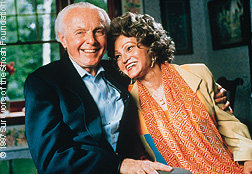Surviving the Horrors of the Holocaust, Tom Lantos Got a Fresh Start at the UW. Now Serving in Congress, His Story is Part of an Oscar-Winning Film.
By Jon Marmor
At 6 a.m. sharp, the Congressional swimming pool in Washington, D.C., opens for business. Without fail, Tom Lantos is first in line, champing at the bit to begin his daily ritual of 45 minutes of swimming laps.
It's just the beginning of another long, grueling day of meetings, hearings and deal-making for the 71-year-old Democratic representative from the 12th Congressional District in California. But it's one he tackles with unfettered passion and awe, especially when he sees the American flag flying on top of the Capitol building as he makes the short walk from his apartment to the office every day.
"I want to make the most of life," says Lantos, who is in his 20th year in Congress. "I like to work hard to make this a better country, to provide a just government for our people and make sure we have learned from the past."
The past defines this University of Washington alumnus in a way few of his fellow former classmates know. Lantos is the only Holocaust survivor ever elected to Congress. A Hungarian-born Jew who grew up during the rise of Adolf Hitler and Nazi Germany, Lantos is one of five people featured in the Academy Award-winning documentary The Last Days. The movie was executive-produced by Steven Spielberg and his Survivors of the Shoah Visual History Foundation, a non-profit organization dedicated to videotaping and archiving interviews of Holocaust survivors the world over.

Rep. Tom Lantos, '49, '50, and his wife
Annette. Photo by Geoffrey Clifford, © 1997 Suvivors of the Shoah Visual
History Foundation.
A leading human rights statesman, he's an expert in foreign policy, and a force in investigating government waste, fraud and mismanagement.
When people tell him his daily schedule is crazy, he just laughs. After all, handling his myriad duties in the nation's capital, jetting 3,000 miles back home to his upper-middle class district south of San Francisco, and keeping up with his wife, two grown daughters and 17 grandchildren is nothing.
"Compared to what I have been through," he says, "this is easy."
